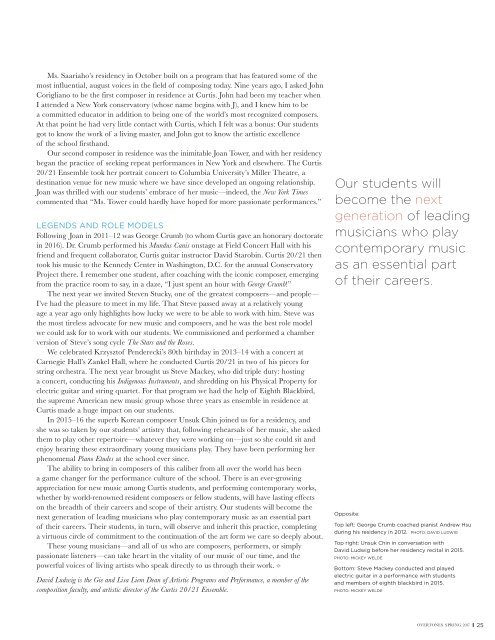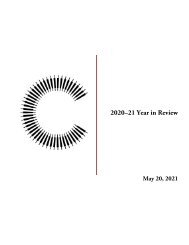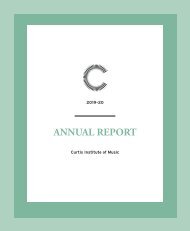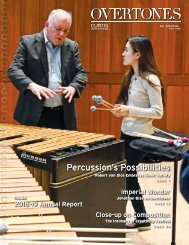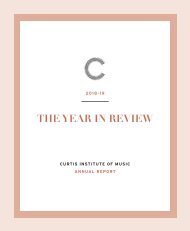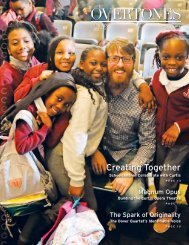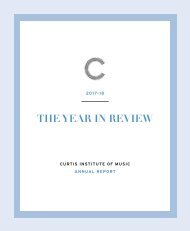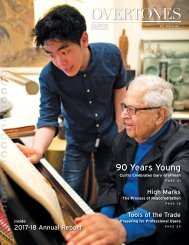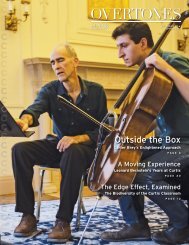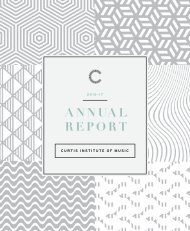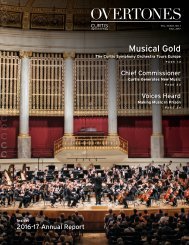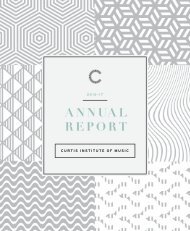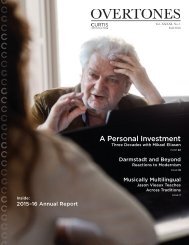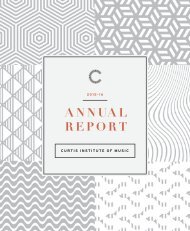Overtones: Spring 2017
Overtones is the semi-annual magazine of the Curtis Institute of Music. The latest issue highlights Curtis’s unique conducting fellows program, residencies by today’s leading composers, a compelling new way of presenting string quartets in performance, and more.
Overtones is the semi-annual magazine of the Curtis Institute of Music. The latest issue highlights Curtis’s unique conducting fellows program, residencies by today’s leading composers, a compelling new way of presenting string quartets in performance, and more.
You also want an ePaper? Increase the reach of your titles
YUMPU automatically turns print PDFs into web optimized ePapers that Google loves.
Ms. Saariaho’s residency in October built on a program that has featured some of the<br />
most influential, august voices in the field of composing today. Nine years ago, I asked John<br />
Corigliano to be the first composer in residence at Curtis. John had been my teacher when<br />
I attended a New York conservatory (whose name begins with J), and I knew him to be<br />
a committed educator in addition to being one of the world’s most recognized composers.<br />
At that point he had very little contact with Curtis, which I felt was a bonus: Our students<br />
got to know the work of a living master, and John got to know the artistic excellence<br />
of the school firsthand.<br />
Our second composer in residence was the inimitable Joan Tower, and with her residency<br />
began the practice of seeking repeat performances in New York and elsewhere. The Curtis<br />
20/21 Ensemble took her portrait concert to Columbia University’s Miller Theatre, a<br />
destination venue for new music where we have since developed an ongoing relationship.<br />
Joan was thrilled with our students’ embrace of her music—indeed, the New York Times<br />
commented that “Ms. Tower could hardly have hoped for more passionate performances.”<br />
LEGENDS AND ROLE MODELS<br />
Following Joan in 2011–12 was George Crumb (to whom Curtis gave an honorary doctorate<br />
in 2016). Dr. Crumb performed his Mundus Canis onstage at Field Concert Hall with his<br />
friend and frequent collaborator, Curtis guitar instructor David Starobin. Curtis 20/21 then<br />
took his music to the Kennedy Center in Washington, D.C. for the annual Conservatory<br />
Project there. I remember one student, after coaching with the iconic composer, emerging<br />
from the practice room to say, in a daze, “I just spent an hour with George Crumb!”<br />
The next year we invited Steven Stucky, one of the greatest composers—and people—<br />
I’ve had the pleasure to meet in my life. That Steve passed away at a relatively young<br />
age a year ago only highlights how lucky we were to be able to work with him. Steve was<br />
the most tireless advocate for new music and composers, and he was the best role model<br />
we could ask for to work with our students. We commissioned and performed a chamber<br />
version of Steve’s song cycle The Stars and the Roses.<br />
We celebrated Krzysztof Penderecki’s 80th birthday in 2013–14 with a concert at<br />
Carnegie Hall’s Zankel Hall, where he conducted Curtis 20/21 in two of his pieces for<br />
string orchestra. The next year brought us Steve Mackey, who did triple duty: hosting<br />
a concert, conducting his Indigenous Instruments, and shredding on his Physical Property for<br />
electric guitar and string quartet. For that program we had the help of Eighth Blackbird,<br />
the supreme American new music group whose three years as ensemble in residence at<br />
Curtis made a huge impact on our students.<br />
In 2015–16 the superb Korean composer Unsuk Chin joined us for a residency, and<br />
she was so taken by our students’ artistry that, following rehearsals of her music, she asked<br />
them to play other repertoire—whatever they were working on—just so she could sit and<br />
enjoy hearing these extraordinary young musicians play. They have been performing her<br />
phenomenal Piano Etudes at the school ever since.<br />
The ability to bring in composers of this caliber from all over the world has been<br />
a game changer for the performance culture of the school. There is an ever-growing<br />
appreciation for new music among Curtis students, and performing contemporary works,<br />
whether by world-renowned resident composers or fellow students, will have lasting effects<br />
on the breadth of their careers and scope of their artistry. Our students will become the<br />
next generation of leading musicians who play contemporary music as an essential part<br />
of their careers. Their students, in turn, will observe and inherit this practice, completing<br />
a virtuous circle of commitment to the continuation of the art form we care so deeply about.<br />
These young musicians—and all of us who are composers, performers, or simply<br />
passionate listeners—can take heart in the vitality of our music of our time, and the<br />
powerful voices of living artists who speak directly to us through their work. <br />
David Ludwig is the Gie and Lisa Liem Dean of Artistic Programs and Performance, a member of the<br />
composition faculty, and artistic director of the Curtis 20/21 Ensemble.<br />
Our students will<br />
become the next<br />
generation of leading<br />
musicians who play<br />
contemporary music<br />
as an essential part<br />
of their careers.<br />
Opposite:<br />
Top left: George Crumb coached pianist Andrew Hsu<br />
during his residency in 2012. PHOTO: DAVID LUDWIG<br />
Top right: Unsuk Chin in conversation with<br />
David Ludwig before her residency recital in 2015.<br />
PHOTO: MICKEY WELDE<br />
Bottom: Steve Mackey conducted and played<br />
electric guitar in a performance with students<br />
and members of eighth blackbird in 2015.<br />
PHOTO: MICKEY WELDE<br />
OVERTONES SPRING <strong>2017</strong><br />
25


